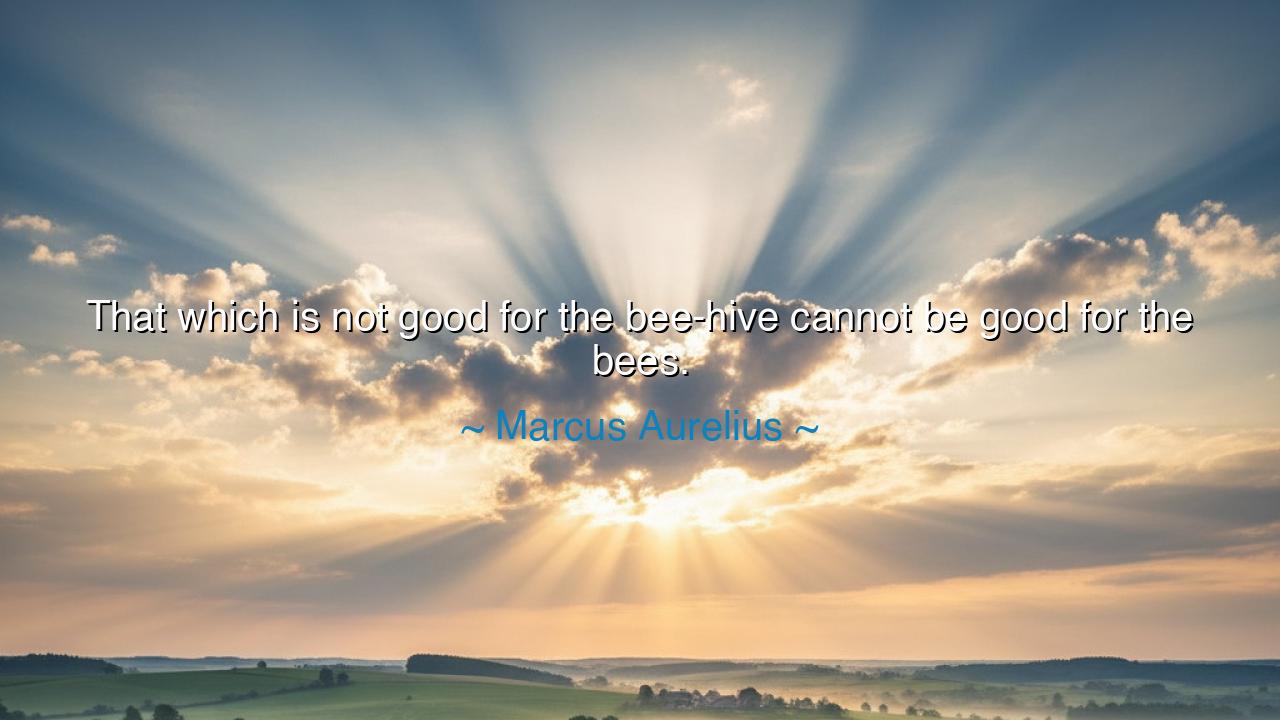
That which is not good for the bee-hive cannot be good for the






Hearken, O seeker of wisdom, to the voice of Marcus Aurelius, emperor and philosopher, whose meditations were written not for display, but for the fortifying of the soul. He declared: “That which is not good for the bee-hive cannot be good for the bees.” In these words lies a vision of life beyond the self, a truth as old as the earth, a teaching that binds the fates of men and women together. For no creature lives unto itself alone; as the bee belongs to its hive, so too does each soul belong to the greater body of humankind.
The bee-hive is the community, the commonwealth, the city, the nation, the family. The bees are the people, small yet essential, each bound to the other in invisible threads of duty and benefit. Aurelius knew that when one seeks selfish gain at the expense of the whole, he wounds not only the hive, but himself. The hive weakened, all bees suffer; the hive strengthened, all bees thrive. Thus, the health of the many is inseparable from the well-being of the one.
Consider the tale of Pericles, the great Athenian leader. In his day, Athens rose to heights of glory, not merely because of the brilliance of a few, but because of the shared devotion of its citizens to their polis. Yet when greed, envy, and faction took root, when men sought their own advancement above the harmony of the state, Athens fell into ruin. The hive was broken, and even the most powerful bees perished within it. This lesson is writ across the tablets of history: no man prospers when the body to which he belongs lies sick or shattered.
Reflect also upon the fall of Rome itself. Luxury devoured the strong, corruption ate the bones of justice, and selfish ambition set citizen against citizen. The empire that once was a mighty hive, feared across the world, became divided within itself. And though emperors still sat upon the throne, the hive had lost its strength, and its bees scattered into dust and darkness. Marcus Aurelius, seeing such shadows on the horizon, warned his heart and ours: tend to the hive, for only then can the bees endure.
This truth is not only for kings and nations, but for every circle of human life. A family where one member takes all for himself will wither in bitterness. A workplace where envy reigns will collapse in strife. Even in friendship, if one drinks of the cup and never offers it in return, the bond will dry and die. Whatever weakens the whole weakens the individual; whatever nourishes the whole nourishes each soul within it.
What, then, is the lesson? It is that the good of the one cannot be torn from the good of the many. If you desire strength, then seek first to strengthen the body to which you belong. Ask not only, “What serves me?” but also, “What serves us?” For in serving us, you also serve yourself more deeply and lastingly. A bee that hoards nectar but abandons the hive will soon perish; but a bee that brings its share back to the hive lives in abundance and purpose.
Therefore, let each of us take practical actions. Give more than you take, that the hive may grow rich. Speak truth even when silence would profit you, that the hive may remain strong. Share your wisdom, your time, your strength, for in doing so you weave bonds that protect you when storms arise. Live not as a wanderer without hive or kin, but as one who knows that his joy, his safety, his honor are all tied to the welfare of the many.
Thus the words of Marcus Aurelius burn as a torch through the ages. Remember: the hive is greater than the bee, yet the bee is nothing without the hive. Guard the hive, love the hive, build the hive—and you shall find that your own life flows with sweetness, as honey poured from the comb of unity.






AAdministratorAdministrator
Welcome, honored guests. Please leave a comment, we will respond soon